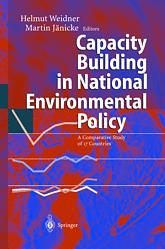

|
Weidner, H., Wissenschaftszentrum für Sozialforschung, Berlin, Germany; Jänicke, M., Freie Universität Berlin, Germany (Eds.):
Capacity Building in National Environmental Policy. A Comparative Study of 17 Countries.
2002. XII, 448 pp. 26 tabs. Hardcover Capacity
Building in National Environmental Policy This book provides a systematic description and analysis of the development of national environmental policies in 17 countries in terms of capacity building. It covers a broad spectrum of different types of countries, ranging from advanced industrial, newly industrializing and transition countries to developing countries, representing all continents. This allows for drawing conclusions about the chances of an effective global environmental policy, the interrelationship between economic and environmental development as well as the importance of globalization, new forms of governance, and democratization for sustainable development. The individual country reports inform about the most urgent environmental problems, national policies and institutions, areas of conflict, the constellation of environmental proponents and opponents, and the main capacity deficits. The editors contribute a broad cross-national survey covering altogether 30 countries and focussing on the diffusion of environmental innovations, the globalization of environmental policy, and the worldwide convergence of basic environmental policy patterns. From
the contents:
The Conceptual Framework of Environmental Capacity Building ·
Australia ·
Austria ·
Brazil ·
Bulgaria ·
Canada ·
Costa Rica ·
Czech Republic ·
France ·
Hungary ·
India ·
Italy ·
Mexico ·
Morocco ·
New Zealand ·
Poland ·
Taiwan ·
Vietnam ·
Summay: Environmental Capacity Building in a Converging World ·
Appendix: Countries and Authors of Volume 1 Kapazitätsbildung in nationalen Umweltpolitiken Der Band liefert eine systematische Beschreibung und Analyse der Entwicklung der Umweltpolitik von 17 Ländern im Hinblick auf die Kapazitätsbildung. Er deckt ein breites Spektrum unterschiedlicher Ländertypen ab, das von fortgeschrittenenen Industrieländern über Schwellen- und Transformationsländer bis hin zu Entwicklungsländern reicht und sämtliche Kontinente einbezieht. Dieses breite Spektrum erlaubt Schlußfolgerungen zu den Chancen einer effektiven globalen Umweltpolitik, den Wechselbeziehungen von ökonomischer und ökologischer Entwicklung sowie zur Bedeutung von Globalisierung, neuen Formen der Governance und Demokratisierungsprozessen für eine nachhaltige Entwicklung. Die einzelnen Länderberichte informieren über die dringlichsten Umweltprobleme, nationale Politiken und Institutionen, Konfliktbereiche, die Konstellationen von Umweltproponenten und -opponenten sowie die wesentlichen Kapazitätsdefizite. Die Herausgeber selbst liefern einen breiten international vergleichenden Überblick, der insgesamt 30 Länder umfaßt und in erster Linie auf die Diffusion ökologischer Innovationen, die Globalisierung von Umweltpolitik und die weltweite Konvergenz von umweltpolitische Grundmustern abstellt. Der Band schließt die zweite Phase eines international vergleichenden Projektes zur Kapazitätsbildung in der Umweltpolitik ab. Die erste Phase umfaßte 13 Länder. Die Ergebnisse wurden 1997 unter dem Titel „National Environmental Policies. A Comparative Study of Capacity-Building“ (hrsg. von Martin Jänicke und Helmut Weidner) ebenfalls beim Springer Verlag veröffentlicht. Aus dem Inhalt: The Conceptual Framework of Environmental Capacity Building · Australia · Austria · Brazil · Bulgaria · Canada · Costa Rica · Czech Republic · France · Hungary · India · Italy · Mexico · Morocco · New Zealand · Poland · Taiwan · Vietnam · Summay: Environmental Capacity Building in a Converging World · Appendix: Countries and Authors of Volume 1 Dr. Helmut Weidner Wissenschaftszentrum Berlin für Sozialforschung (WZB) Prof. Dr. Martin Jänicke Freie Universität Berlin |